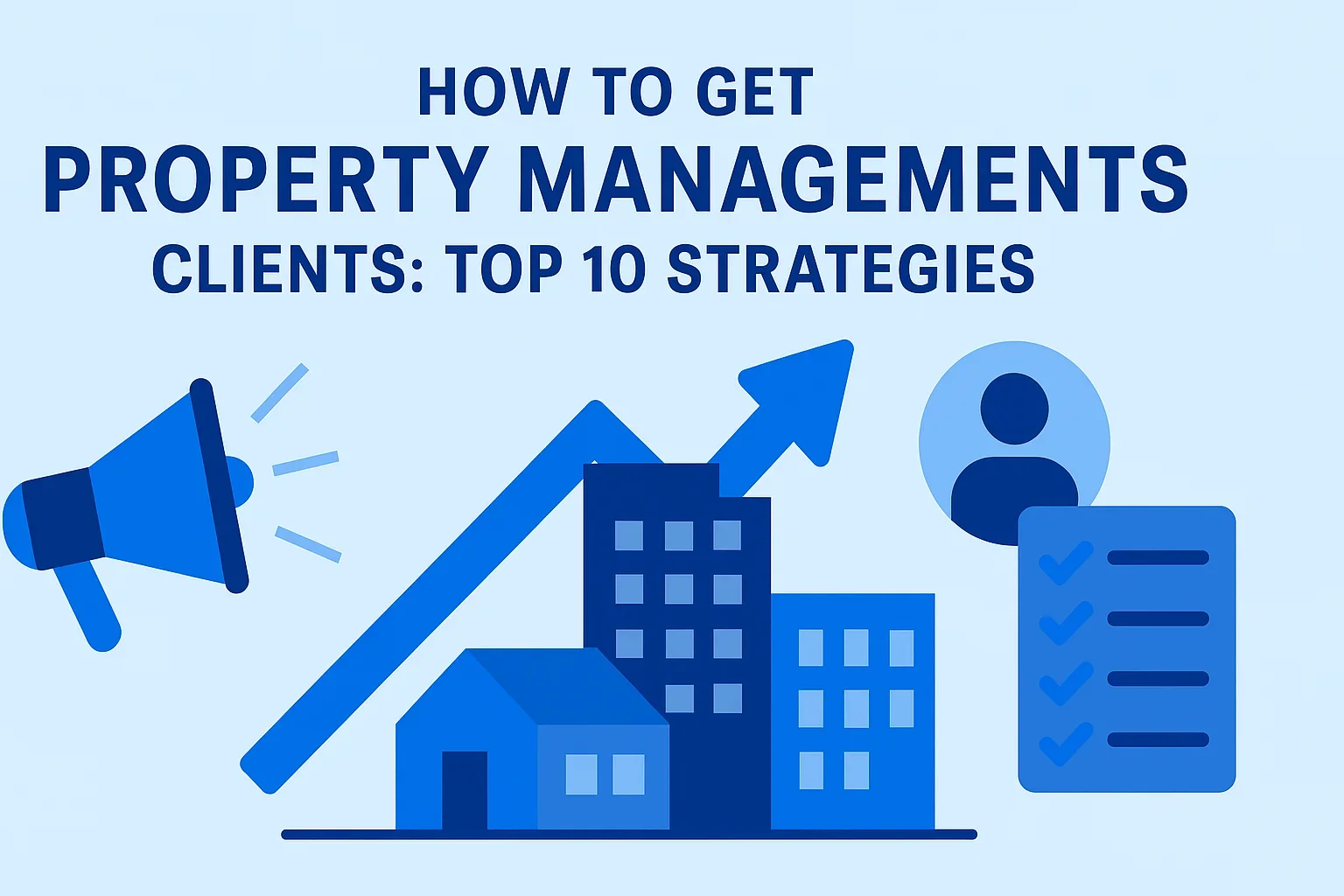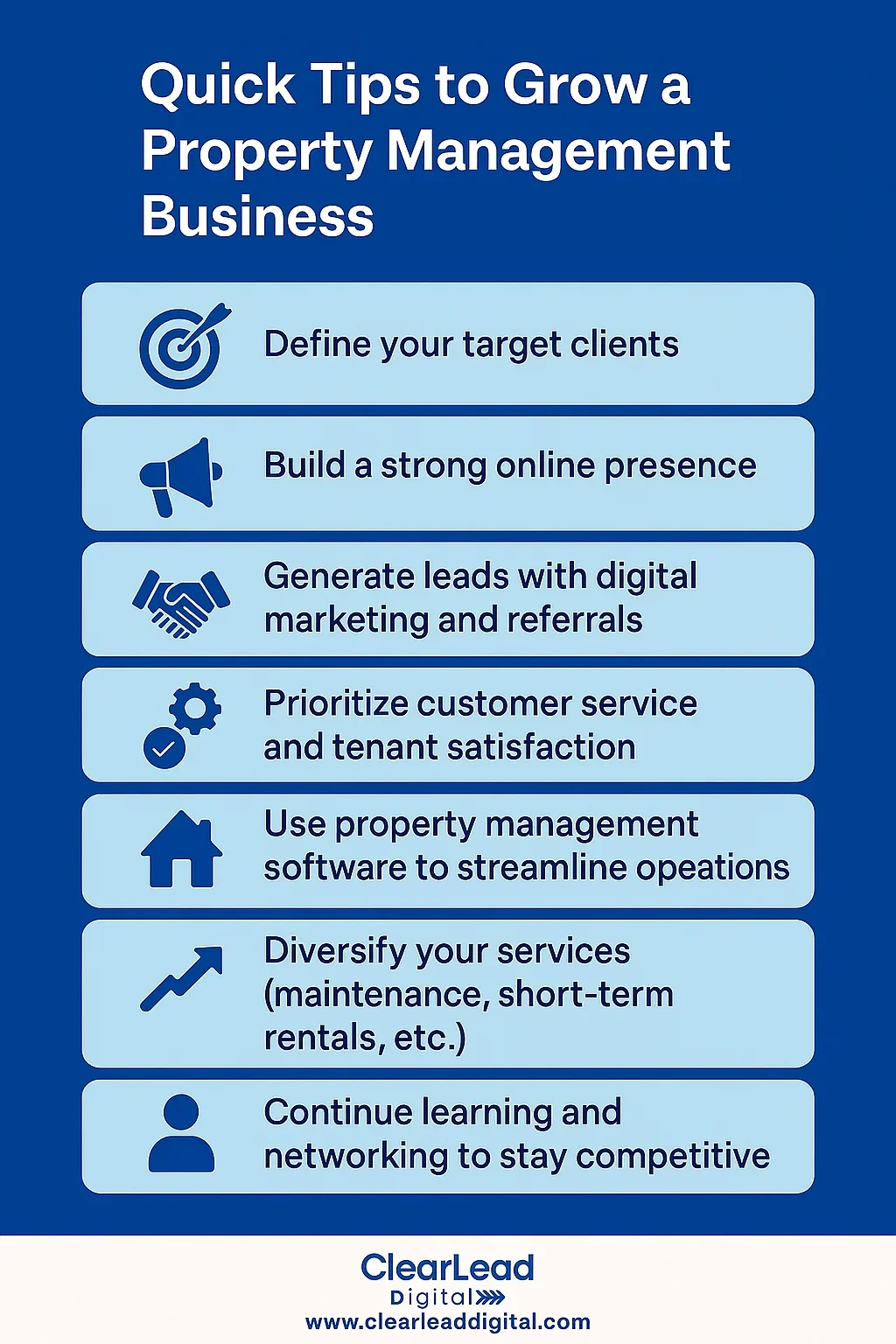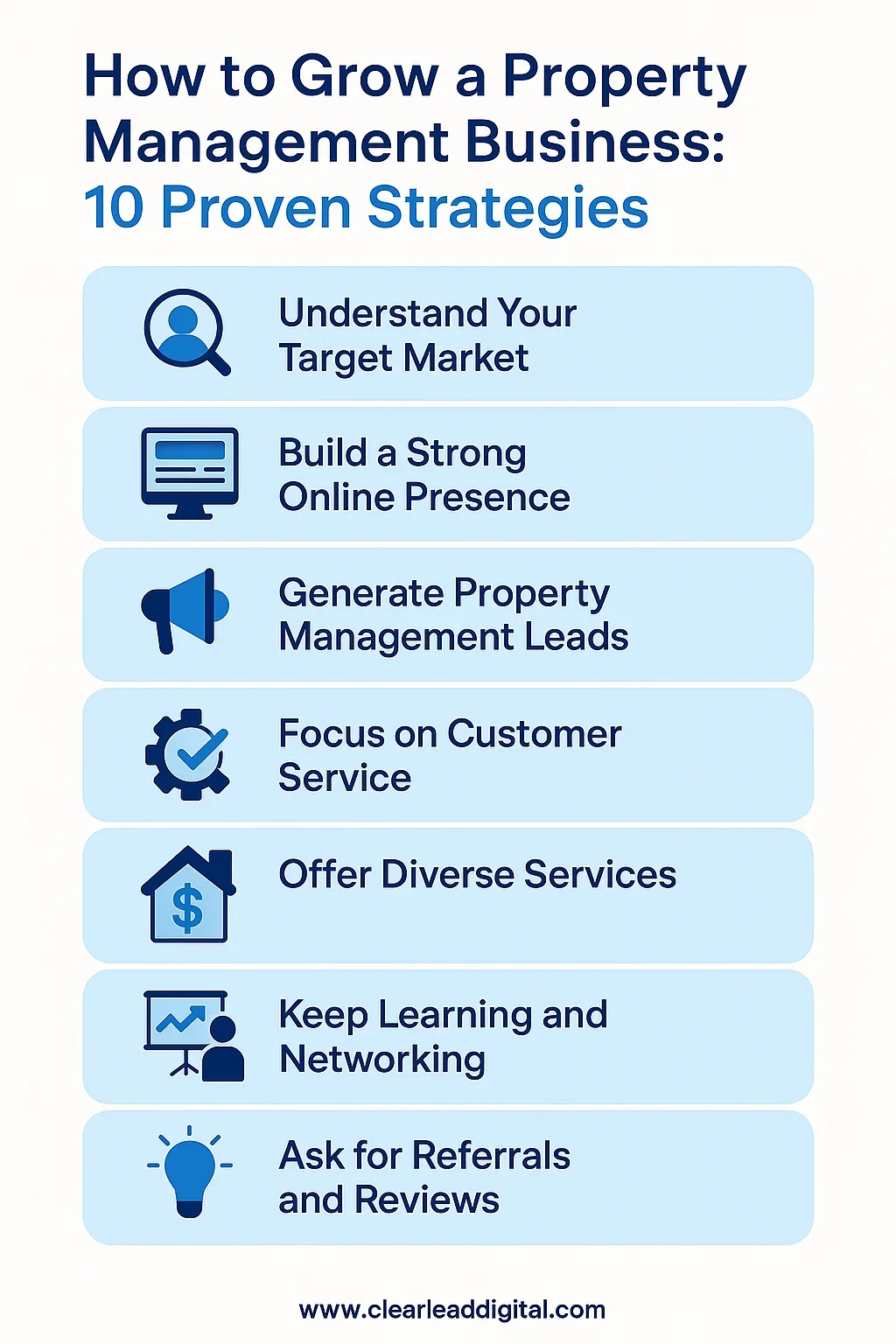How to Get More Property Management Clients: Top 10 Tips
Last Updated: November 15, 2025
Learning How to Grow a Property Management Business takes more than collecting rent and fixing repairs. Success comes from attracting the right clients, keeping them happy, and running operations smoothly. In this guide, you’ll learn how to get more property management clients with our top 10 proven strategies. These tips help property managers build stronger sales systems, scale faster, and stay competitive in today’s market.
Table of Contents
Growing a property management business takes more than handling tenants and collecting rent. To scale, you need a clear strategy that blends marketing, technology, customer service, and smart operations. The goal is to attract new clients, keep existing ones happy, and run your business efficiently.
Below are 10 proven strategies to help you grow a property management business in today’s competitive market.
Quick Tips How to Get More Property Management Clients
Define your target clients
Build a strong online presence
Generate leads with digital marketing and referrals
Prioritize customer service and tenant satisfaction
Use property management software to streamline operations
Diversify your services (maintenance, short-term rentals, etc.)
Continue learning and networking to stay competitive
1. Understand Your Target Market
To grow your property management business, you first need to know your audience. Are you serving single-property landlords, large investors, or short-term rental owners?
Action steps:
Create client personas with demographics, property types, and service expectations.
Identify common pain points (vacancy rates, late rent, high turnover).
Research local rental trends to see what’s in demand.
When your services align with client needs, you’ll attract better leads and improve retention.
2. Build a Strong Online Presence
Most property owners start their search online. If you’re not visible, you’re losing clients to competitors.
Action steps:
Create a user-friendly, mobile-optimized website.
Keep active social media profiles with helpful tips, property updates, and success stories.
Regularly publish content (blogs, guides, videos) that highlights your expertise.
Optimizing Your Website for SEO
Use keywords like property management services in [city], optimize your meta descriptions, and ensure fast load speeds. Ranking well in Google will bring consistent inbound leads.
3. How to Get New Property Management Clients
Lead generation is the engine of growth. Beyond word of mouth, use modern tools to consistently attract new clients.
Action steps:
Use CRM systems and email automation to nurture leads.
Run paid ads (Google Ads, Facebook Ads) targeting local landlords.
Offer free resources (guides, checklists, case studies) in exchange for contact info.
Networking also matters. Build relationships with Realtors, investors, and local contractors to earn referrals.
4. Focus on Customer Service
Great customer service helps you retain clients, reduce turnover, and get more referrals.
Action steps:
Communicate clearly and consistently with both clients and tenants.
Solve tenant issues quickly and keep owners updated.
Collect feedback regularly and act on it.
Happy clients are your best marketing tool.
5. Leverage Technology and Automation
Manual processes waste time and cause mistakes. Property management software helps you scale while improving service.
Action steps:
Use software for tenant screening, rent collection, maintenance tracking, and financial reporting.
Implement chatbots or automated messaging for quick responses.
Provide clients with an online portal for transparency.
The right tools free you up to focus on growing your business instead of putting out fires.
6. Offer Diverse Services
Property owners want one-stop solutions. Expanding your services makes your company more valuable.
Examples of services to offer:
Routine maintenance and 24/7 repair services
Short-term rental management (Airbnb, Vrbo)
Eviction support and legal compliance assistance
Marketing vacant units with professional photography and listings
Diversified services increase revenue streams and client loyalty.
7. Keep Learning and Networking
The property management industry is always evolving. Staying educated helps you stay competitive.
Action steps:
Take online courses on real estate laws, digital marketing, or finance.
Attend industry events and seminars.
Join professional organizations like NARPM (National Association of Residential Property Managers).
Knowledge and networking open doors to new strategies and clients.
8. Ask for Referrals and Reviews
Word of mouth is one of the strongest growth drivers in property management.
Action steps:
Create a referral program with discounts or rewards.
Ask satisfied clients to leave reviews on Google, Yelp, and Facebook.
Showcase testimonials on your website and marketing materials.
A strong reputation builds trust and attracts new clients faster.
9. Invest in Marketing
A solid marketing strategy puts you in front of the right clients.
Action steps:
Run targeted social media ads and Google Ads.
Use SEO to rank for local searches like property management company near me.
Publish blog posts, videos, and case studies to build authority.
Content marketing not only attracts leads but also shows expertise in property management.
10. Set Clear Goals and Track Progress
Without measurable goals, growth is just guesswork.
Action steps:
Define clear objectives (e.g., add 20 new doors in 12 months).
Break down goals into smaller steps and assign responsibilities.
Review progress regularly and adjust strategies when needed.
Milestones keep you and your team accountable and motivated.
Final Thoughts
Growing a property management business doesn’t happen overnight. It’s about building strong systems, delivering great service, and staying visible to the right clients. Start small by focusing on one or two strategies, then expand as you gain traction.
👉 If you want tailored growth strategies for your market, consider scheduling a property management marketing consultation to get a customized plan.
Free eBook: Learn How to Get More Property Management Clients with These 50 Strategies
Frequently Asked Questions (FAQs)
-
The fastest way to grow is to combine digital marketing with referrals. Optimize your website for SEO, run local ads, and actively ask clients for reviews and referrals. This brings in both immediate and long-term growth.
-
Client satisfaction. Happy property owners and tenants lead to referrals, renewals, and positive reviews. Strong customer service often beats aggressive marketing.
-
Yes, if you want to scale efficiently. Software automates rent collection, maintenance tracking, tenant communication, and reporting. Without it, you’ll hit an operational ceiling.
-
Focus on SEO, local search optimization (Google Business Profile), paid ads, and content marketing. A professional website and active social media presence build trust and visibility.
-
It depends on your market. In areas with high tourism demand, short-term rentals can be very profitable. If regulations are strict, long-term rentals may be more stable.
-
It varies by location and service model, but most property management companies start seeing solid profitability around 50–100 doors. Efficiency and pricing structure matter just as much as scale.
-
A good rule of thumb is 5–10% of your revenue. Invest in a mix of digital ads, SEO, and referral programs to get the best return on investment.




